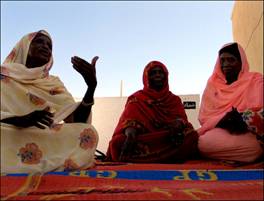|
|
Singers of Sudan Study War No More
By Marc Lacey, The New York Times
July 12, 2004

Traditional singers demonstrating their new repertory after a peace workshop.
Photo By Guillaume Bonn for The New York Times
YALA, Sudan - Before they head out to battle, the militiamen who have been rampaging through the Darfur region in Sudan sit down together on straw mats and listen to songs of war.
Until recently, Fatima Mohamed Sanusi was one of those who used her melodious voice to stir up ferocity in the Arab militiamen.
She is a hakamah, a traditional Sudanese singer, and war songs are just a small part of a repertory that includes songs of love, mourning and celebration.
But there has been plenty of fighting lately in this harsh area near the border with Chad, and Ms. Sanusi, like so many other hakamah, has been belting out war song after war song.
Making up the lyrics as she goes along, she has sung of bravery and strength. She has sung of the need to stick up for the tribe. She has sung of the courageousness of past generations.
Her songs, and those of other hakamah, have had their intended effect.
The Arab militias, full of pride and fury, have driven more than one million black Africans from their homes since early 2003, causing a crisis for civilians that the United Nations says is without parallel anywhere in the world.
The fighting is partly a result of a rivalry over resources between groups of Muslims in Darfur. The Arabs are nomads who have long competed for land with black African farmers, also Muslim.
A rebel movement started last year by black Africans here brought the situation to a boil. The rebels say black residents of Darfur have been marginalized by the federal government in Khartoum, which is dominated by Arabs.
Eager to crush the rebels, government soldiers have joined forces with the Arab militias, which are known as Janjaweed. The result has been fierce fighting that has left Darfur in tatters. Most of the victims have been black African villagers caught in the cross-fire.
After so much bloodshed, Ms. Sanusi and some of the other hakamah in Darfur say they have been wishing they could take back their songs. Mostly elderly women, hakamah play an essential role in maintaining the traditions of Sudan's many Arab tribes. They are regarded as wise women who have special insight into the world.
Their change of heart was not accidental though.
In an effort to calm tensions here, the Peace Studies Center at the University of Nyala recently invited Ms. Sanusi and 29 other hakamah to a special two-day workshop for influential community leaders. There were lectures on the history of the conflict and pleas to the hakamah to use their considerable power for good.
Initially, organizers of the workshop said, the hakamah denied that they were to blame for the violence. But as the discussions progressed, one of the hakamah eventually broke down in tears and acknowledged her role in the fighting.
By the end, all the participants agreed that they could do far more than they had been doing to spread nonviolent messages in their songs.
"They are very respected," said Ashwag Elnour, director of the government-financed peace center. "People listen to their songs and follow what they say."
Ms. Sanusi, now well into her 70's, said that "when I was very small, I took care of the cows," and that the training to become a hakamah "began back then."
She learned to sing and dance, waving her hair in the air and gyrating her neck. As she grew, she polished her ability to come up with poetry on the fly, singing words to help babies enter the world, to honor those who had died and to mark community celebrations.
Eventually, after years of training, community elders tapped Ms. Sanusi as a full-fledged hakamah.
She now rewards generosity, bravery and other acts of virtue with songs of praise.
Dishonorable acts are denounced through lyrics that send shame to the perpetrators and their kin.
Hakamah are more than poets and singers. They are community judges, of sorts, admired and feared by those who join them around the straw mat.
The songs of the hakamah reach every tribe member's ears, and who would not want one's name lauded in lyrics that float from the throat of the hakamah into the desert night?
"My authority in the tribe is indirect," said Ms. Sanusi, her weathered face peering out of a long yellow robe decorated with brown flowers. "I sit in the tribe and watch the people. If someone does something wrong, I say a poem about it. I change his attitude. If someone is not generous, if he keeps all his money to himself, I'll say something. If someone is not brave in war, I'll say something about him."
These days, however, Ms. Sanusi and the other hakamah who attended the peace workshop devote much of their attention to one topic.
Ms. Sanusi and four other hakamah from South Darfur gave a demonstration the other day. They sat on a straw mat outside the peace center in Nyala, all dressed in bright multicolored robes. Their fingers and toes were tattooed with elaborate designs. It was their voices, though, that were most arresting.
Singing and chanting in Arabic, one after another they showed how hakamah can sing as persuasively about peace as they can of war.
"May the children grow with no fighting in their lives," sang Shara Muhammad Farah-Aldoor.
"What happened to you, Sudan?" sang out another, Zaida Hamad Jabro. "We mourn the deaths. We long for an end to war."
|

|
|



